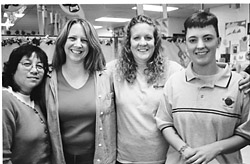|
San Jose Hope Rehabilitation Services May 2002
by Ed Herzog HOPE Rehabilitation Services in the South Bay serves people wit h developmental disabilities and their families, including those with mental retardation, autism, cerebral palsy, brain trauma, and other neurological impairments, as well as persons with multiple disabilities. Hope is one of the few agencies serving the developmentally disabled whose employees are organized. Since 1952, HOPE has provided work training, job placement, developmental activities, professional counseling, infant services, a senior center, supported and independent living services, and mobility training for more than 2,000 children, adults, and seniors. HOPE clients come from Santa Clara, San Benito, San Mateo, Santa Cruz, and Monterey Counties. Bobby Smith is an independent living skills trainer. He teaches clients independent living skills such as shopping, budgeting, cooking, housekeeping, travel training, and socialization skills. He meets with people on his caseload on a weekly basis, depending on need. Many individuals stay with him for years. “We get close to the people we serve,” says Smith. “It’s rewarding to see them gain in self confidence as they expand their horizons and become more self sufficient.” Thanks to union representation, Smith and the other workers at HOPE earn more than their counterparts at other agencies. “This is the only place that offers decent wages and benefits. Even so, it’s barely livable considering the high cost of living in this area,” adds Smith. “We don’t do this work for the money, but because we care about the people.” Smith is able to empathize with his clients from direct personal experience. At 19 he suffered massive head trauma from a near-fatal automobile accident that left him with a speech problem. After extensive speech therapy and support he made it back, and decided to give something back. “I experienced what life was like with a developmental disability. It made me value life more and respect people who haven’t had the same opportunity as I’ve had,” says Smith. But because of budget cuts and an ever expanding number of clients, workers like Smith are limited in the services they can provide. “We’re down staff because of a hiring freeze. There is also extensive staff turnover because people can make so much more working elsewhere.” Budget cuts also limit the services Smith and other trainers can provide for their clients. “The need is much greater than the ability of the agency to provide,” says Smith. “Fewer clients, because of staff cuts, are placed in jobs, and we have a long waiting list. With adequate funding we could do so much more.” Even with these limitations Smith, like the other dedicated 535 members who work with the developmentally disabled, give of themselves to this largely ignored and invisible population and are working hard to transform their agency to meet the needs of the developmentally disabled community. One of their new and exciting programs is the Silicon Valley Diversified Network. The network will operate differently than other community-based services in that it will provide services developed along small (three person) groupings. A completely community based service, it will provide support according to an individual’s needs versus providing a schedule of activities based on a program structure. All learning and skill development will take place within the community where the clients live. There is no “day program” or “center.” “Each consumer’s schedule will be centered around the consumer’s interests and needs, skills, and uniqueness,” explains community support facilitator Vikki Jump. “Given the right support, we believe each individual can be a productive, contributing member of society. It also gives each consumer more autonomy and a greater sense of control over their lives.”
|
|||||||||

